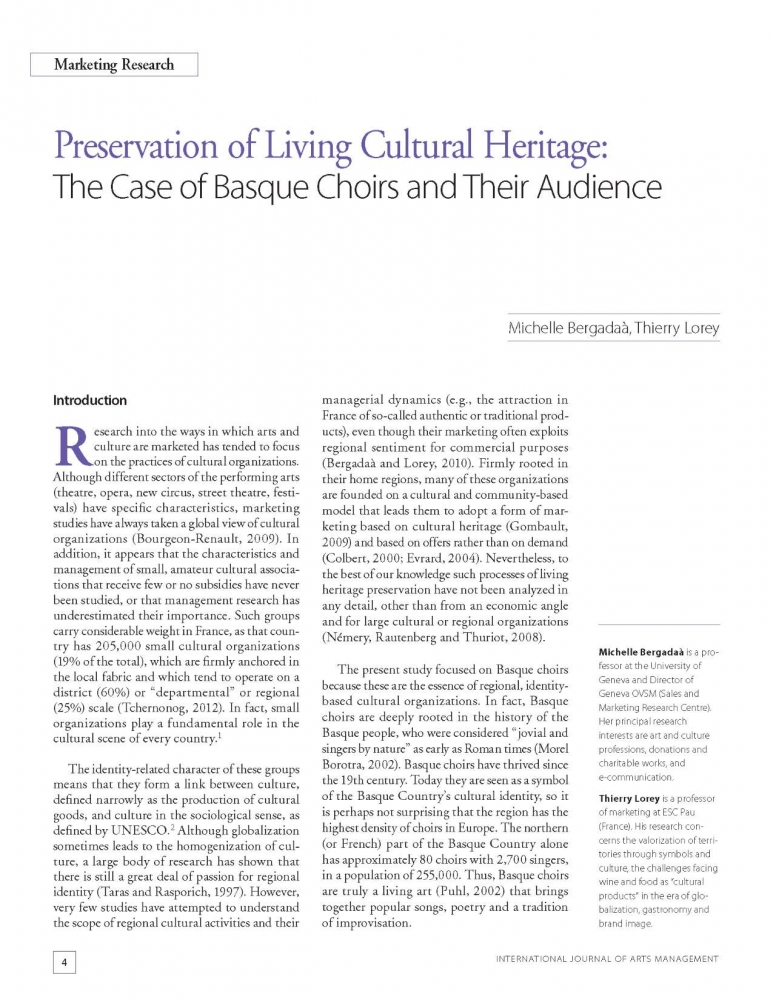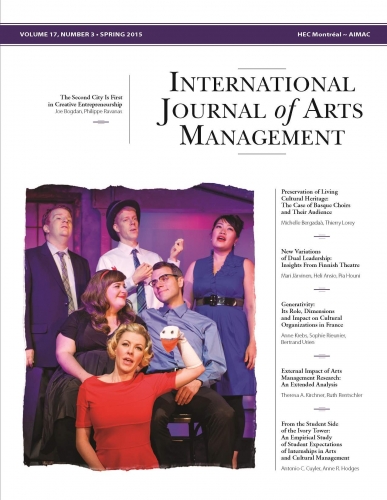Preservation of Living Cultural Heritage: The Case of Basque Choirs and Their Audience
Produit: Article
21,00 $ CA
Michelle Bergadaà, Thierry Lorey
Michelle Bergadaà is a professor at the University of Geneva and Director of Geneva OVSM (Sales and Marketing Research Centre). Her principal research interests are art and culture professions, donations and charitable works, and e-communication.
Thierry Lorey is a professor of marketing at ESC Pau (France). His research concerns the valorization of territories through symbols and culture, the challenges facing wine and food as “cultural products” in the era of globalization, gastronomy and brand image.
ABSTRACT
The study analyzes Basque choirs as a cultural model of an identity-related performing art produced by small associations. It uses grounded theory to investigate the identity-related and cultural roots of Basque choirs and to determine the characteristics of how they function. The results concern both theory and methodology. In terms of theory, the authors draw up a model of cultural production centred around the audience and define a specific form of marketing aimed at preserving living cultural heritage. In terms of methodology, they devise a novel, two-stage research protocol that allows them to determine the identity- and community-related risks facing Basque choirs and to recommend marketing strategies for preserving this cultural heritage. Their proposals could also apply to other types of regional cultural associations wishing to strengthen their cultural identity in response to the pressures posed by globalization.
KEYWORDS
Basque choirs, living cultural heritage, cultural model, cultural identity, roots
RÉSUMÉ
Cet article analyse les chœurs basques, qui représentent un modèle culturel d’un art identitaire de l’interprétation produit par de petites associations. Il s’appuie sur une recherche de terrain qui examine les racines identitaires et culturelles des chœurs basques et relève les caractéristiques de leur fonctionnement. Les résultats de l’étude portent à la fois sur la théorie et sur la méthodologie. En ce qui concerne la théorie, les auteurs établissent un modèle de production culturelle centré sur le public et définissent une forme spécifique de marketing ciblant la préservation d’un patrimoine culturel vivant. Pour ce qui est de la méthodologie, ils conçoivent un double protocole de recherche qui leur permet de déterminer les risques liés à l’identité et à la communauté auxquels font face les chœurs basques. Cela amène aussi les auteurs à recommander des stratégies de marketing axées sur la conservation de cet héritage culturel. Leurs propositions peuvent également s’appliquer à d’autres types d’associations régionales désirant renforcer leur identité culturelle en réponse à la pression que la mondialisation exerce sur elles.
MOTS CLÉS
Chœurs basques, patrimoine culturel vivant, modèle culturel, identité culturelle, racines
RESUMEN
En este estudio se analizan los coros vascos como modelo cultural de un arte escénico identitario producido por pequeñas asociaciones. Utilizando la teoría fundamentada, se investigan las raíces culturales y de identidad de los coros vascos y se determinan las características de su funcionamiento. Los resultados que se presentan son a la vez teóricos y metodológicos. En el aspecto teórico, los autores elaboran un modelo de producción cultural que gira en torno al público definiendo además una forma específica de mercadotecnia destinada a preservar el patrimonio cultural vivo. En el plano de la metodología, conciben novedoso protocolo de investigación en dos etapas que les permite determinar los riesgos relacionados con la identidad y la comunidad a los cuales los coros vascos se enfrentan y recomiendan estrategias de comercialización que ayuden a preservar mencionado patrimonio cultural. Sus sugerencias pueden también aplicarse a otros tipos de asociaciones culturales regionales que desean fortalecer su identidad cultural en respuesta a las presiones de la globalización.
PALABRAS CLAVE
Palabras clave: coros vascos, patrimonio cultural vivo, modelo cultural, identidad cultural, raíces

